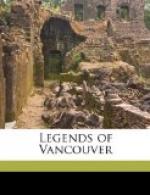“Kla-how-ya,” smiled Maarda.
“Kla-how-ya, tillicums,” I replied, and watched for many moments as they slipped away into the blurred distance, until the canoe merged into the violet and grey of the farther shore.
THE DEEP WATERS
Far over your left shoulder as your boat leaves the Narrows to thread the beautiful waterways that lead to Vancouver Island, you will see the summit of Mount Baker robed in its everlasting whiteness and always reflecting some wonderful glory from the rising sun, the golden noontide, or the violet and amber sunset. This is the Mount Ararat of the Pacific Coast peoples; for those readers who are familiar with the ways and beliefs and faiths of primitive races will agree that it is difficult to discover anywhere in the world a race that has not some story of the Deluge, which they have chronicled and localized to fit the understanding and the conditions of the nation that composes their own immediate world.
Amongst the red nations of America I doubt if any two tribes have the same ideas regarding the Flood. Some of the traditions concerning this vast whim of Nature are grotesque in the extreme; some are impressive; some even profound; but of all the stories of the Deluge that I have been able to collect I know of not a single one that can even begin to equal in beauty of conception, let alone rival in possible reality and truth, the Squamish legend of “The Deep Waters.”
I here quote the legend of “mine own people,” the Iroquois tribes of Ontario, regarding the Deluge. I do this to paint the color of contrast in richer shades, for I am bound to admit that we who pride ourselves on ancient intellectuality have but a childish tale of the Flood when compared with the jealously preserved annals of the Squamish, which savour more of history than tradition. With “mine own people,” animals always play a much more important part, and are endowed with a finer intelligence, than humans. I do not find amid my notes a single tradition of the Iroquois wherein animals do not figure, and our story of the Deluge rests entirely with the intelligence of sea-going and river-going creatures. With us, animals in olden times were greater than man; but it is not so with the Coast Indians, except in rare instances.
When a Coast Indian consents to tell you a legend he will, without variation, begin it with, “It was before the white people came.”
The natural thing for you, then, to ask is, “But who were here then?”
He will reply, “Indians, and just the trees, and animals, and fishes, and a few birds.”
So you are prepared to accept the animal world as intelligent co-habitants of the Pacific slope; but he will not lead you to think he regards them as equals, much less superiors. But to revert to “mine own people”: they hold the intelligence of wild animals far above that of man, for perhaps the one reason that when an animal is sick it effects its own cure; it knows what grasses and herbs to eat, what to avoid, while the sick human calls the medicine-man, whose wisdom is not only the result of years of study, but also heredity; consequently any great natural event, such as the Deluge, has much to do with the wisdom of the creatures of the forests and the rivers.




